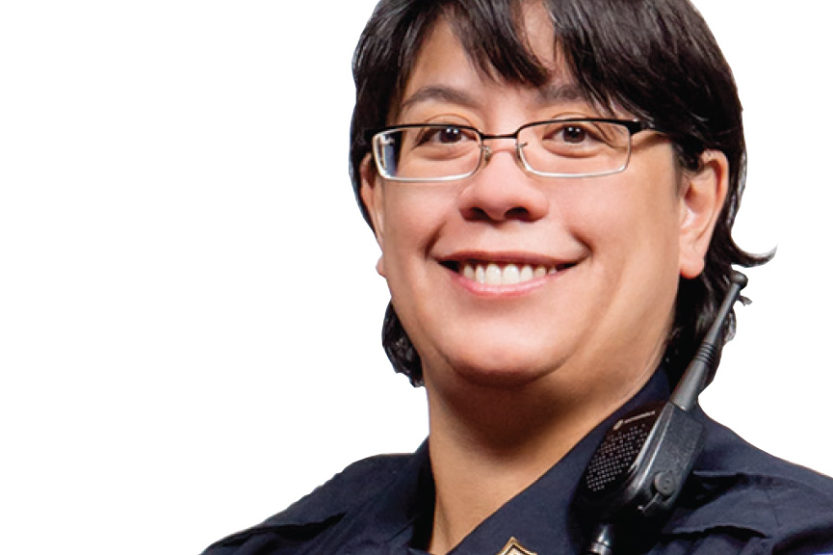In Class: Defensive Coordinator
 University Police Sgt. Joan Fiesta. (By L. Biran Stauffer)
University Police Sgt. Joan Fiesta. (By L. Biran Stauffer) I have been at the University of Illinois since 1989. As an undergraduate, I started out in engineering and ended up in rhetoric. The English department is just wonderful here. I started working on the Student Patrol and began to see myself pursuing a career in law enforcement.
I was hired in 1993 as a University Police officer. We started teaching Rape Aggression Defense workshops in 1996. I absolutely fell in love with the prospect of preventing crimes, of helping people develop instincts where they could get away from an attack before it happens.
RAD workshops are divided into several sessions and combine lectures and physical activities. We start by teaching about awareness and crime prevention because we figure that’s about 90 percent of stopping an attack.
With college students, we talk about: What are your safety plans for going to bars with your friends? What are some of the threats in your world, and what practices work to make you safe? With faculty and staff, we change it to: You’re traveling. You’re going to a conference. What part of town is it located in? Are there social events? We want people to make plans for themselves—to imagine things happening before they actually happen.
We believe that about a third of our students who enter the RAD program are survivors of gang violence or sexual assault.
We started teaching radKIDS in ’98; “rad” stands for “resisting aggression defensively.” We work with little kids on
up to preteens. They get to have fun and hit stuff.
We’ve also offered Resisting Aggression with Defense for Men class and had moderate success with it. It’s hard sometimes getting men to say, “Yes, I need self-defense.”
I’m currently studying servant leadership in an online master’s program through Gonzaga University. Most of
my work is based on applying different theories to police-community relations. I went to Northern Ireland in 2013 and learned about peace communication and how different people are serving to help with the continuing conflict.
Policing is really, really not a pretty profession. Especially if we have to use force. That’s why community trust is so important.
I have people from all over campus and the community who’ll call me and say, “Hey! Can we do a program together?” That stuff’s fun. Versus: “911, what’s your emergency?” “Hi. There’s a big fight.” You show up, and there are people fighting. You have to put them in handcuffs and take them away. If you’ve ever tried [to do that with] somebody who does not want to have their hands put behind their back—there’s a physical element to that.
After one course, a woman said to me, “I came into your program a victim of sexual assault, and now I leave your program knowing that I’ve survived it. And I can go and thrive.” Wow! That’s the best part, when we can help an individual like that.
RAD classes are open to the community. Let me get you a brochure.
Edited and condensed from an interview conducted on Aug. 14, 2014.


